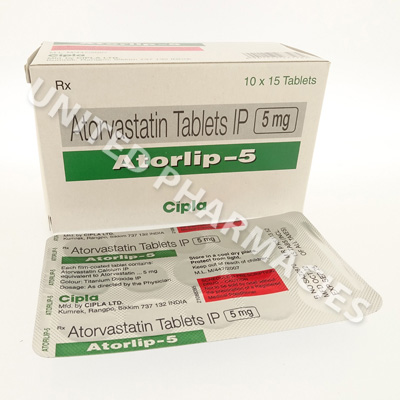Customers also like
Description
| Main Use | Active Ingredient | Marketed Name |
| High levels of cholesterol | Atorvastatin Calcium | Atorlip |
Uses
Atorlip (Atorvastatin Calcium) works by lowering the levels of lipids (fats such as cholesterol). It is widely used to treat patients affected by hypercholesterolaemia and hyperlipidaemia. Other uses include the prevention of serious cardiovascular events in people deemed at risk of this, either due to obesity, diabetes, hypertension or other risk factors. The main active ingredient in this medicine is known as a statin, however doctors often refer to it as a selective inhibitor of the enzyme HMG-CoA.
This enzyme is responsible for producing cholesterol in the liver, which is then circulated in the blood. Elevated blood levels of cholesterol and LDL (low density lipoprotein) are known to increase the risk of atherosclerosis and cardiovascular disease. Blocking HMG-CoA helps to decrease cholesterol production, which has the effect of reducing the levels of cholesterol in the blood. A slight increase in HDL (high density lipoprotein, a type of good fat) is also triggered, which may also contribute to a decrease in the risk of cardiovascular events.
Dosage and Administration
Atorlip (Atorvastatin Calcium) tablets contain 5mg of the active ingredient. The dosage will need to be individualized so as to ensure that the needs of each patient will be met. Adults treating hyperlipidaemia or mixed dyslipidaemia are sometimes told by their doctor to start with 10mg or 20mg taken once per day, however if a larger decrease in LDL is needed, the doctor may instruct the patient to start with 40mg per day. Patients will normally have their lipid levels assessed within 2 to 4 weeks of starting treatment or adjusting the dosage, and the doctor may decide to make changes to the dosing schedule. In all cases, the instructions of the doctor must be strictly followed.
Side effects
Treatment with Atorlip (Atorvastatin Calcium) tablets might result in some patients experiencing side effects:
- Sore joints
- Memory problems
- Runny or blocked nose
- Pain in the lower back
- Flatulence, nausea and diarrhoea
You must tell the doctor about any side effects that occur, especially if they persist or worsen. Certain reactions caused by this medicine may be serious in nature, and you will need emergency medical assistance straight away if you suffer from bruising, bleeding, discoloured urine, skin peeling or lesions, eye irritation or any other severe reactions which have not been listed here.
Precautions
Although it is considered rare, there have been reports of rhabdomyolysis and acute renal failure occurring in patients treated with this medicine. Patients who have previously suffered from renal impairment may be more at risk of this and may need to be supervised closely by their doctor during treatment.
Your doctor may make recommendations with regard to diet and exercise, so as to ensure that your cholesterol can be properly managed. Also, grapefruit and its juice should be avoided during treatment, as it may cause an increase in the levels of medicine in the blood.
Seek immediate emergency medical attention if you suffer an allergic reaction. Symptoms to watch for, which may be indicative of a reaction, include skin rashes, hives, swelling of the face or limbs, trouble breathing, and trouble swallowing.
Always use Atorlip (Atorvastatin Calcium) as you have been prescribed by your doctor. Never self-medicate or change your dosage without first consulting your doctor. The correct dosage can vary depending on your health, medical history, and the severity of the condition being treated.
This medication may not be safe for all patients. Before you begin using it always disclose the following to your doctor:
- If you are pregnant or breastfeeding.
- If you suffer from any allergies.
- If you suffer from any other health conditions or illnesses.
- If you are using any other medicine (including all non-prescription).
- If you are using any supplements, vitamins, or herbal products of any kind.






